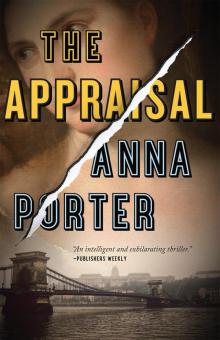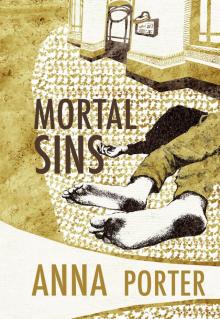- Home
- Anna Porter
Hidden Agenda Page 15
Hidden Agenda Read online
Page 15
She was putting her laundry through the old washer in the basement when the phone rang. She tore upstairs, tripped over the laundry basket, the hall chair and the vacuum cleaner she had brought up earlier (in case she had time). Breaking her own recent speed record, she made it on the fifth ring.
“Hello,” she panted into the telephone.
“Is that Mrs. Hayes?”
“Yes. Huh…huh…” If she’d known it was not going to be David, she would have walked.
“Maybe we should let you catch your breath,” the unfamiliar voice continued steadily.
“Who is this?” Judith demanded.
“It is not so very important for you to know who I am, my dear. What is very important indeed for you to understand is that I am a sensitive person.” He paused as if to contemplate the sensitivity of his person, then came back again. “In the past few days you have been causing me some problems, and I am particularly sensitive to problems…”
“Is this some new kind of filthy phone call?” Judith interrupted. About all she needed now was some nut to discuss his sensitive cock and this one sounded like he had a masochistic tendency as well. “If it is, I’d just as soon you got the hell on with it so I can hang up.”
“That would be most unwise, Mrs. Hayes. We have something of yours that you will want to have returned.”
“You have nothing of mine.”
“But we do,” the voice said as if it were the most natural thing in the world. “Your children.”
Judith felt the blood begin to pulse in her ears.
“And if you were to hang up now, how could we hope to negotiate the terms?”
“The terms? What terms?” Judith yelled into the telephone.
“Please stop interrupting. It would be much easier for both of us if you listened. And for them too. Lovely young people they are, and I’m as anxious to send them to you as you must be to have them back. We have not hurt them. Not yet. So you needn’t worry. Though they have spent an uncomfortable night—that couldn’t be avoided. And they have been most cooperative, really. Question is, will you be as obliging?”
“What do you want?… Where are they?” Judith shouted over the pounding in her ears.
“I could hardly tell you where they are, now, could I?” the voice said calmly. “But I’d be most happy to tell you what the terms are. Believe me, my dear, we’re not in the habit of hurting young people, and, frankly, it’s difficult to figure out what to do with them over a long period. Most difficult.”
He stopped to give Judith a chance to think over the implications of what he had said, then continued, like a tour guide, taking her through a chamber of horrors. “Now. You are to stop your infernal meddling about George Harris. He is dead and gone, and no business of yours. Is that quite clear, so far?”
“Yes,” Judith said hoarsely. “Yes, quite clear. What about my children?” But it wasn’t clear, it was as though she were having a dizzy spell, the sound had turned hollow and distant.
“Give us a show of good faith and we will send Jimmy and Anne home. Now, do I have your word?”
“Yes, yes…my word…yes…”
“The implications, my dear, are simple: if you do not fulfill your end of the bargain, we will take the children again and next time there will be no bargaining. Is that clear?”
“I…yes.”
“As for the show of faith… Hand in your little story. I’m certain your magazine will be relieved to see it at last. Today. Understood?”
“Yes.”
“And, Mrs. Hayes, I’m afraid I must insist you keep your boyfriend out of this.”
“I haven’t…”
“And the rest of the police department. We wouldn’t want any complications now, would we?” He hung up.
Judith held onto the phone. She didn’t know when she had started shaking, but her body was bitterly cold and the hand holding the phone shook uncontrollably. The palsied hand dropped the receiver and left it dangling by the cord.
She pulled herself up, supporting herself against the wall. Feeling her way along the rough unfamiliar surface, knocking over the lamp, the couch hitting her in the shins, she made it to the foot of the stairs and stood, clutching the big round ball of the lower banister post.
That high grating sound came from her own dry throat.
A show of good faith. Her stomach clenched against the rising vomit. She ran upstairs to the typewriter where her story lay scattered over the desk and bed, the white pages floating in the afternoon sun. She clawed at them, sorting them into some sequence, mostly the original version, a tribute to Harris—his death an unsolved mystery—then numbered the pages in black felt pen, the ink smeared by her damp palm.
With the pages under her arm Judith raced downstairs and out the door, jumped into the car, barefoot still. The key didn’t fit. She jumped out again, knocking her head on the roof, staggered onto the road, stopped.
“Get hold of yourself,” she said, her voice shrill in the humming silence of the street. She leaned against the car, peeled the manuscript pages away from her body, the outside sheets wet with perspiration, laid them on the car seat, neatly, one on top of the other, and examined the car keys. “OK,” she said to herself. “Steady, now, these are the right keys.” She got back into the Renault, turned on the ignition, and pulled out onto the road with a jerk at the steering wheel.
She must follow instructions exactly.
She double-parked in front of the Saturday Night building leaving her lights flashing, ran the four flights of stairs to the top, asked the receptionist for a large envelope, inserted her story, addressed it to the managing editor, and scrawled URGENT on the outside.
PART FOUR London
Eighteen
LONDON IN SPRINGTIME is magical. It’s not only that spring comes so suddenly after a seemingly endless wait through bone-chilling dampness, though that has a lot to do with the gleaming friendliness of Londoners in April. What lends the city that quality of enchantment is the early blooming flowers. It’s the crocuses in Hyde Park, the daffodils in Cadogan Square, the tulips around Westminster. They replace the soggy winter gray with crisp new light.
Marsha loved London in April. She didn’t exactly take time out for the flowers, but she did stay near Hyde Park and her morning runs along the lanes lent her days a sparkle. Each year she returned at the same time.
Her day started early. She had taken the 5:00 p.m. flight from New York, so that she could count on a good sleep before her first appointment. But it hadn’t worked out that way. Green’s, usually eager to please its regular customers, was fully booked. Hard as they had tried to find her something close to the old-fashioned opulence they had proffered on previous visits, their best remaining space was a crowded little room near the Bond Street entrance, its window overlooking the roof of the kitchen. And it was overlooking it very closely indeed: the roof was only inches below the windowsill.
At 7:00 a.m. Marsha had been visited by several brisk, strolling pigeons. They made a great fuss of her clothes spread out on the dressing table. They cooed around the mirror admiring their own reflections, pecking at Marsha’s blue and yellow silk scarf. They were cheerfully curious and a touch pushy. When Marsha tried to shoo them outside, they puffed up in indignation and fluttered deeper into the room.
As she waged the battle of the pigeons, the kitchen staff arrived and, judging by the clatter of dishes downstairs, wasted no time preparing for breakfast. Marsha gave up all pretense of catching more sleep, pulled on her navy jumpsuit, piled her hair up into a tight top-knot, and headed out toward Piccadilly.
***
It was a crisp, clear day, the traffic was sparse, only a few people on the street hurrying toward Green Park tube station. Marsha walked along one of the gravel paths that led to Queen Victoria and Buckingham Palace. At first she took long, loping steps, feeling her muscles stretch and come alive after the dreary flight from New York bunched up in the seat next to a talkative hairstylist from Hollywood who was ta
king a holiday from the stars. It had been much less comfortable back in the tourists before her promotion. She used to think that if only she could make it to first class, she could enjoy herself. Her new title, Larry had said, practically obliged her to travel first class—vice-presidents of publishing should display the wealth of their firms, it only proved the astuteness of their decisions—but she didn’t like the trans-Atlantic flights any more. Lucky she had no ambitions to join the jet set; she wouldn’t pass the first test.
When she reached Victoria’s Memorial her breathing had adjusted to the pace, the cool air filled her lungs with the scent of flowers. She stretched her arms and her legs, loosening her muscles, then started running, slowly at first. She speeded up around St. James Park Lake, rounded The Mall, up Marlborough Road, St. James’s Street, across Piccadilly and back to Green’s.
She was barely out of breath when she stepped under the warm shower. She ran her hands down her hips and thighs. Firm and lean. Her buttocks were as high as they had ever been, no middle-age sag. She was lucky to have been born with good skin and small breasts, though she had never thought she would one day consider herself lucky for the latter. She remembered waiting for her breasts to sprout when she was twelve and all the other girls at BSS were beginning to show slight bulges. Later, when they had turned sixteen and their breasts bounced up and down in their tight black bathing suits on the way to the swimming pool, Marsha was still waiting. During her last summer vacation she had finally decided to join the grown-ups and purchased herself a size 32B brassiere with white lace and slight contouring. By then she’d given up hope.
She wrapped herself in a large soft white towel and lay down on the bed to dry out and prepare herself for the day.
Eric Major of Hodder was booked for lunch. She was rather hoping that he would suggest the Ritz. It was a great place for spotting publishing celebrities. That was where she had last seen Sir George Weidenfeld, and Billy Collins, Lord Harding of Penhurst. Charles Pick of Heinemann. All separate tables, of course.
She was hoping Eric would still have some manuscripts for her next Spring list. She knew Tom McCormack of St. Martin’s had been in London on a buying trip a couple of weeks ago, and Tom had an unerring instinct for “the big book” from Britain. Not even Tom’s detractors could deny that, once he had run off with the James Herriot books. Who else could have predicted the public’s inexhaustible interest in God’s furry creatures, great and small?
At 3:00 she would see André Deutsch, at 4:30 Livia Gollancz. She hadn’t seen André since Frankfurt. There would be a lot to talk about. It was comforting to know that Tom had missed Deutsch on his trip. André was the first British publisher Marsha had ever met, back in the golden days before the pound slumped, the Australians rebelled, the British houses pulled in their horns from the international scene, back when nobody in the book world had even thought of disputing British territorial rights throughout the old Empire. It was at a vast, glittering Reader’s Digest party at the Hotel Intercontinental. Her very first Frankfurt Book Fair. Marsha was still low enough on the executive ladder that she thought she must impress everybody. Max Grafstein had introduced her to the legendary André Deutsch at the door. In ten minutes he had put her at ease, in another two successfully unloaded her on to the unsuspecting Livia Gollancz. But by then she was ready to start taking care of herself.
She was looking forward to seeing them both again.
Dinner was at Green’s with Simon Master of Pan. Marsha had brought along a couple of manuscripts to show him. They were ideal for the Pan list and, if he was willing to make an offer for them before she returned, they could bypass some hassles. The author of one—a difficult little man with a formidable amount of talent he didn’t deserve—was between agents. He had fired his first over a deal with the Book of the Month Club the agent had turned down as a ploy to force the club to up its original offer. They hadn’t. The other manuscript was a thriller with a British setting. Far superior to the author’s previous effort, and that had fetched close to $500,000 worldwide. Marsha thought that if she and Simon put in a joint offer now, they could get the world for the same price. If they waited, the agent would go to auction and the price might grow too high for the book.
She wished she had made Hamilton, Thornbush her first appointment. When Margaret sent out the telexes and juggled the hours to fit everyone’s schedules, Marsha had thought it wise to treat Peter as just another publishing friend—and to allow herself a day to acclimatize before she faced him. Her time had already been pieced out before she learned of the Harris manuscript.
She considered calling Peter again to warn him, but decided he would think her mad. What he didn’t know about the manuscript presumably couldn’t harm him.
Marsha dressed in pearl-gray, a touch of color at the neck. She filled her canvas bag with papers and proofs, tucked two books under each arm and headed out toward St. James’s Square.
Nineteen
ALL NIGHT JUDITH SAT BY the window, her face pressed against the cold damp glass, and waited. Her breathing was high-pitched and uneven. She watched the street, intensely aware of every movement, each car door banging, doors slamming, barking dogs, caterwauling. David had called. She claimed she was too busy to talk to him. On her way out, she had said. Around 7:00 a white van delivered a box of flowers. She had left it outside, leaning against the door.
At midnight the young couple across the street had a fight over her flirting with his boss. At 2:00 a.m. their baby cried, and cried. Neither of them picked it up. At 3:00 it had quietened, and whined itself to sleep.
Judith wrapped her arms around herself and rocked slowly from side to side. Her throat was aching dry.
At 6:00 a.m. the newspaperboy tossed rolled-up papers at the porches on the other side of the street. He kicked over a garbage can and watched the lid roll down the road with a clatter.
It had started to rain.
Twenty
BUT FOR A NAGGING concern about Peter’s safety, Wednesday had been a perfect day for Marsha.
Lunch at the Ritz hadn’t produced celebrities but it had led to one excellent author Eric was willing to let her publish, and a reciprocal deal for a string of mysteries that would find a congenial home with Eric’s paperback line.
André had been courtly, though unwilling to let her purchase The History of the Russian Revolution without consulting his new partner. He had reminisced about early years with Eric Sandwell and the tragedy of his sudden death. Marsha wondered if André was thinking about writing his own memoirs.
Livia Gollancz hadn’t wanted to join in M & A’s production of The Last of the Wild Horses, though she loved the photographs and was, personally, a fan of horses in the wild. She thought the time of the lush illustrated book had passed. She suggested Marsha talk to Sidgwick and Jackson. Marsha had bought US rights to two of Livia’s forthcoming cookbooks. Though British cooking was hardly the culinary success of the century, there was a new nostalgia in the States for old ways.
Dinner with Simon was sumptuous, and he had found the double purchase Marsha offered quite irresistible, though he hadn’t read the manuscripts personally. He thought Peter was a natural for the Hamilton, Thornbush board. With the ubiquitous Anthony Billingsworth-Powell supporting him, the rest of the board would have to accept. Powell’s boards included too many of the other communications giants, and his tentacles were said to range from the Upper House to the international oil companies. Publicly he was a respectable dove, a fact that made some cynics curious about Peter Burnett’s swelling list of antiwar books.
***
Thursday had started early, with a David Higham agent’s breakfast. Afterward, she decided to walk to Hamilton, Thornbush. She needed fresh air and time alone.
Number 37 South Audley Street must once have been a stately home. Now it was surrounded by ambassadorial mansions flying a variety of obscure flags from countries with Western sympathies. They were close enough to Grosvenor Square to feel the protective presence of
the giant chrome and granite building fronted by the two huge iron eagles: the embassy of the United States of America.
Marsha paused by a long line of people carrying signs and slogans urging the Americans to get out of Egypt and the United Kingdom where their military bases were, decidedly, not wanted. Several of the demonstrators hauled paper bags full of ripe tomatoes.
Number 37 was four stories of red Georgian brick. The windows were protected by stout iron bars, as were the two diminutive trees and faded patches of grass on either side of the entrance. To the right of the oak door a discreet brass plaque declared that this was the home of Hamilton, Thornbush Limited, established in 1887. Inside, to the left of the central staircase, there was a small reception area with two broad armchairs and a low oak coffee table covered with magazines and carefully folded newspapers. A second brass plaque pointed an arrow toward the receptionist hidden behind a wooden partition with a small window at shoulder level.
Marsha asked to be announced to Peter Burnett, then settled into one of the armchairs to finish her reading of The Times. She knew from past experience that British publishers never expected anyone to appear on time, as they were rarely punctual themselves. She thought they considered it somewhat bad manners to be punctual. For Marsha it was hard to shake old habits. Besides, she rather enjoyed the club atmosphere of the Hamilton, Thornbush waiting room.
“Miss Hillier?”
Marsha looked up.
“Yes?”
The carefully coiffed hair, pulled tight at the temples and back into a bun, the straight tailored blue dress with white cotton collar buttoned high on the neck, close-set blue eyes peering over the top of the horn-rimmed half-moon glasses, the mouth set into familiar grooves of good-natured formality: Eric Sandwell’s perfect secretary.
Marsha jumped up to greet her.

 Deceptions
Deceptions Hidden Agenda
Hidden Agenda The Appraisal
The Appraisal Mortal Sins
Mortal Sins In Other Words
In Other Words